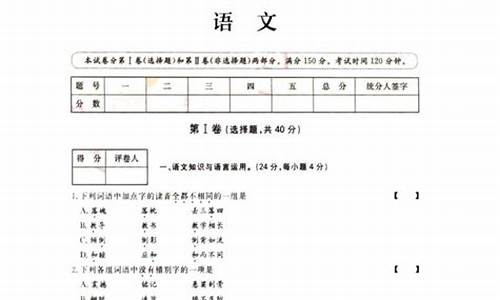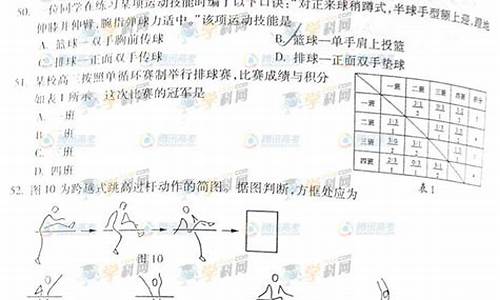您现在的位置是: 首页 > 热门专业 热门专业
高考必背英语单词_高考必背英语
tamoadmin 2024-07-21 人已围观
简介1.高中英语:高考英语常考60个句型+例句2.高考必记英语单词3.英语高考作文万能套用句型 开头结尾必背模板4.2022年必背高考英语作文范文5.高考英语必背高频词汇 It is urgent that immediate measures should be taken to stop the situation. 应立即取措施阻止这一事态的发展。To be frank, I can not a
1.高中英语:高考英语常考60个句型+例句
2.高考必记英语单词
3.英语高考作文万能套用句型 开头结尾必背模板
4.2022年必背高考英语作文范文
5.高考英语必背高频词汇

It is urgent that immediate measures should be taken to stop the situation. 应立即取措施阻止这一事态的发展。To be frank, I can not agree with their opinion for the reasons below.坦率地说,我不能同意他们的意见,理由如下。
2022高考英语万能模板
引出不同观点的万能模板:
1、People's views on... vary from person to person. Some hold that... . However, others believe that.... 人们对……的观点因人而异。有些人认为.....然而其他人却认为……
看这个长度就已然鹤立鸡群。其实,也是一个蛮简单也好记的模板。
2、Attitudes towards (drugs) vary from person to person. 人们对待的态度因人而异。
乍一看,跟上句的开头神似,其实就是省略掉了"people's",不仅清爽而且好像高端了一些。
3、People may he different opinions on... 人们对……可能会有不同的见解。
一个婉转的句子,展示其客观性。
4、There are different opinions among people as to... 关于……人们的观点大不相同。
"different"虽拉低了水准,但"as to"又拯救了回来。
5、Different people hold different attitudes toward (failure). 对(失败)人们的态度各不相同。
这句话貌似亮点不多,顶多一个"hold",但也容易理解。
经典高考英语作文模板1.说明事物的现状;2.事物本身的优点和缺点; 3.你对事物的看法.
Nowadays many people prefer A because it plays a significant role in our daily life. In general, Its advantages can be seen as follows. Firstly, --------A的优点之一. Besides,-------- A的优点之二. What?s more, --------A的优点之三. However, every coin has its two sides. The negative aspects are also arent. One of the important disadvantages is that ----------A的缺点之一. In addition, ---------A的缺点之二. To make matters worse, ----------A的缺点之三. Through the above analysis, I think that the positive aspects overweigh the negative ones. Therefore, I?d like to hold my view that---------我的看法. From the comparison between these positive and negative effects of A, we should take it reasonably and do it according to the circumstances we are in. Only in this way can we -------对前景的预测.
高中英语:高考英语常考60个句型+例句
语法点一、名词和冠词
考点有名词的可数与不可数,名词的格,名词作定语,冠词的考点是,定冠词与不定冠词,零冠词.
二、代词和it的用法
一般常考的是other,another,the other,others的区别,both,either,neither,all,every,each,none的区别。
还有something,anything,everything的用法(这个比较简单)这一块最难的应该是it,that,one作代词时的区别了。
三、介词和连词
一般考动词的固定搭配,in,at,for,to,of,on,with,about,from,into,after···常用介词.连词最常考得应该是“除此之外”了,expect,expect for,besides,还有表原因的连词;as,for,since,because的区别。
四、形容词和副词
这一块比较简单最常考的就是比较级了,其次是以ly结尾但不是副词的词了,比如说friendly是形容词,形容词的排序问题在今年的高考中也出现了,不过这个是基础但不是重点。
五、动词和动词短语
这个考点是重点,在完形填空及改错和单选中是必考的,这个只能靠你自己的积累,课本中的动词短语是重点,必须记下来。
六、情态动词和虚拟语气
常见的情态动词就够应付考试了,虚拟语气是高中语法的难点但不是重点。
七、动词的时态和语态(就是主动句和被动句)
时态有一般现在时,一般过去时,现在进行时,过去进行时,一般将来时,现在进行表将来,一般现在表将来,过去将来时(一般不考),现在完成时,过去完成时,现在完成进行时(现在很常考)。
八、非谓语动词
动名词作主语,不定式作主语,动名词作宾语,不定式作宾语,动名词作定语,不定式做定语,这一块也比较简单九、数词和主谓一致,数词的考点;基数词,序数词,分数,百分数,(这一块既不是难点也不是重点),主谓一致在以前比较重要,现在地位有所下降。
十、简单句和并列句
十一、定语从句
这可是重点,不过只要上课认真听,这一块其实不难理解。
十二、名词性从句
常和定语从句进行比较区别,尤其是what和that的区别。
十三、状语从句
时间地点状语从句,原因状语从句,结果状语从句,方式状语从句,目的状语从句,有一个问题可以总结以上三个从句。
十四、省略,倒装和强调
比较常考的是,部分倒装和全部不倒装,这一块就这一个重点。
十五、交际英语
也就是口语,这一部分现在很火,每年必考,这个只有靠自己总结.以上就是十五道选择题的来源,当然,不是哪个都会考得,只要学会以上十五个考点,在高考时绝对没问题。
扩展资料:
学好语法的办法:
1、代词。学习代词,首先要对代词的定义、性质、功能及种类有一定的认知;掌握各类代词的用法以及人称代词前后指称的一致的用法。其中各类代词的用法以及不定代词的用法极其构成的固定搭配是学习重点。下面我给出我的学习建议:同学习名词一样,掌握了各个语法要点之后做练习。
2、数词。学习数词时,掌握各类数词的用法、倍数表达法、基数词的特殊念法与时间和数字有关的数词。其中各类数词的用法是学习重点。
3、形容词。掌握形容词的位置及使用顺序和“级”的概念,能辨析不同词缀的形容词。其中形容词的辨析是学习的难点。
4、副词。学习副词,要掌握副词在句子中的位置、顺序和意义相近副词的辨析。其中副词在句中的位置、功能是学习重点,而意义相近副词的辨析是学习难点。
高考必记英语单词
高中英语:高考英语常考60个句型+例句
高中英语入门超级重要的60个句型,附有例句,不爱记语法理论的同学,一定要多背自己不熟悉的句式。
1. as…as?和……一样
中间必须用形容词或副词原级。例如:
This classroom is as big as that one.
这间教室和那间一样大。
He runs as fast as Tom.?
他和汤姆跑的一样快。
否定结构:not as/so…as,“不如……”。上面的两个句子可分别改为:
This classroom is not as/so large as that one.
这间教室不如那间大。
He doesn’t run as/so fast as Tom.
他跑得不如汤姆快。
2. as soon as 一……就……
用来引导时间状语从句。若主句是一般将来时,从句要用一般现在时。例如:
I’ll tell him the plan as soon as I see him.
我一看到他就告诉他这个。
He’ll go home as soon as he finishes his work.
他一完成工作就回家。
3. be busy/enjoy/hate/go on/finish doing sth. 忙于/喜欢/讨厌/继续/完成做某事
在enjoy, finish, hate, go on, be busy等词语后,一般用动词-ing形式作宾语。例如:
Lin Tao is busy making a model plane.
林涛正忙着做飞机模型。
My mother enjoys taking a walk after supper.
我妈妈喜欢晚饭后散步。
I hate watching Channel Five.
我讨厌看五频道。
When someone asked him to he a rest, he just went on working.
当有人让他休息一会儿时,他仍继续工作。
I he finished writing the story.
我已经写完了故事。
4. fill…with 用……装满......;be filled with 充满了……;be full of 充满了......
①be filled with 说明由外界事物造成的此种状态,表示被动。例如:
The box is filled with food.
盒子里装满了食物。
②be full of说明主语处于的状态。此外,还可表示程度,意为“非常”。例如:
The patient’s room is full of flowers.
那个病人的房间摆满了花。
The young man is full of pride.
那个年轻人非常骄傲。
③这两种结构还可以相互改写。例如:
I fill the box with food. The box is full of food.
5. be good/bad for 有利于/有害于……
此句型是:be+adj.+for+n.结构。例如:
Doing morning exercises is good for your health.
做早操对你的健康有益。
Always playing computer games is bad for your study.
总玩电脑游戏对你的学习不利。
6. be used to(doing) sth. 习惯于……
后必须接名词或动名词,可用于现在、过去、将来的多种时态。be 可用get,become来代替。例如:
He is used to life in the country.(He is used to living in the country.)
他习惯于乡村生活。
He will get used to getting up early.
他将会习惯于早起。
注意:be used to do 的意思是“被用来做……”。例如:
Wood is used to make paper.
木材被用来造纸。
7. both…and…两者都……
用来连接两个并列成分;当连接两个并列主语时,其后谓语动词用复数。例如:
Both the students and the teachers will go to the History Museum tomorrow.
不论老师还是学生明天都会去历史博物馆。
8. can’t help doing sth. 禁不住做某事
help在此的意思是“抑制,忍住”,其后接动词-ing形式。例如:
His joke is too funny. We can’t help laughing.
他的笑话太有趣了,我们禁不止笑了起来。
9. sth. costs sb. some money 某物花费某人多少钱
此句型的主语是物。cost一词带的是双宾语,它的过去式、过去分词和原型一样。
This book cost me five yuan.
这本书花了我五元钱。
10. either…or… 不是……就是……,或者……或者……
用来连接两个并列成分,当连接并列主语时,谓语动词与邻近的主语保持一致。
You may either stay here or go home.
你可以呆在这儿,也可以回家。
Either she or I am right. = Either I or she is right.
不是她对就是我对。
11. enough (for sb.) to do sth. 足够……做……
在此结构中,for用来引出不定式的逻辑主语。例如:
The ice isn’t thick enough for you to walk on.
这冰还没有厚到你可以在上面走的程度。
12. feel like doing sth. 想要做……
此处like为介词,后面跟动词-ing形式。此句型与would like to do sth.同义。例如:
I feel like drinking a cup of milk.
我想喝一杯牛奶。
13. feel/find/think it adj./n. to do sth. 认为某事……
在此结构中it为形式宾语,不定式短语作真正的宾语。例如:
I find it very interesting to play football.
我发现踢足球很有趣。
She thinks it her duty to help us.
她认为帮助我们是她的职责。
14. get ready for sth./to do sth.
get ready for sth.意为“为某事做准备”;get ready to do sth.意为“准备做某事”例如:
We are getting ready for the meeting.
我们正在为会议做准备。
They were getting ready to he a sports meet at that moment.
他们那时正准备开运动会。
15. get/receive/he a letter from 收到……的来信,相当于hear from
Did you receive a letter from John?
你收到约翰的来信了吗?
I got a letter from my brother yesterday.
我昨天收到了我弟弟的一封来信。
16. had better (not) do sth. 最好(别)做某事
had better为情态动词,其后需用动词原形。had better常用缩写,变成’d better,其否定形式是在其后直接加not。例如:
We had better go now. = We’d better go now.
我们最好现在走吧。
You’d better not go out because it is windy.
今天刮风,你最好别出去了。
17. he sth. done 使(某事)完成 (动作由别人完成)
sth.为宾语,done为过去分词作补语。例如:
We had the machine repaired.
我们请人把机器修好了。
注意区分:We he repaired the machine. 我们(自己)已经修好了机器。
18. help sb. (to) do sth./with sth. 帮助某人(做)某事,其中的to可以省略。例如:
I often help my mother with housework.
我常常帮助妈妈做家务。
Would you please help me (to) look up these words?
请你帮助我查查这些词好吗?
19. How do you like……? 你认为……怎么样?与what do you think of …?同义。例如:
How do you like the weather in Beijing?
你认为北京的天气怎么样? 你觉得这部新**如何?
20. I don’t think/believe that… 我认我/相信……不……
其中的not是对宾语从句进行否定而不是对主句否定(否定前移)。that可省略。例如:
I don’t think it will rain.
我认为天不会下雨。
I don’t believe the girl will come.
我相信那女孩不会来了。
21. It hens that… 碰巧…… 相当于hen to do,例如:
It hened that I heard their secret.
可改写为:I hened to hear their secret
我碰巧听到了他们的秘密。
22. It’s/has been +一段时间+since从句 自从某时起做某件事情已经一段时间了
该句型中since引导的时间状语从句常用一般过去时。例如:
It’s twenty years since he came here.
他来这里已经20年了。
It has been six years since he married Mary.
他和玛丽结婚已经六年了。
23. It is +adj./n. + for sb. to do sth. 做某事对某人来说……
It是形式主语,真正的主语是不定式to do sth。例如:
It’s not easy for us to study English well.
对我们来说学好英语并不容易。
It’s a good idea for us to trel to the south.
去南方旅行对我们来说是个好主意。
24. It’s + adj. + of sb. to do sth.
It是形式主语,to do sth.是真正的主语, 当表语(即形容词)能对逻辑主语描述时,常用介词of,而不用for。例如:
It’s very polite of you to give your seat to old people.
你给老人让座,非常有礼貌。
25. It seems/ears (to sb) that… (在某人看来)好像……
此句中的it是主语,that引导的是表语从句。例如:
It seems that he is lying.?
看样子他好像是在撒谎。
It ears to me that he never smiles.?
在我看来,他从来没有笑过。
26. It is +数词+metres/kilometers long/wide… ……是多少米(公里)长(宽)
用来表示物体的长(宽,高),如数词大于一,名词要用复数。例如:
It is 20 metres long from this end to that end.?
从这端到那端有二十米长。
27. It’s time for sb. to do sth. 是某人干某事的时候了
it是形式主语,真正的主语是动词不定式to do sth. 例如:
It’s time for the child to go to bed.
孩子该睡觉了。
比较下面两种结构:
① It’s time for + n. 例如:
It’s time for school.
②It’s time to do sth. 例如:
It’s time to go to school.
28. It takes sb. some time to do sth. 花费某人多少时间做某事
it是形式主语,真正的主语是动词不定式to do sth。例如:
It takes her fif minutes to walk to the bus stop from here.
从这儿走着到公交车站将花费她15分钟。
It took the old man three days to finish the work.
那个老人花了三天时间完成这项工作。
29. keep (on) doing sth. 一直坚持做某事
keep doing sth.一般用于静态动词。keep on doing sth.意为“继续不停地做某事”,一般用于动态动词,但二者的区别并不是很严格,有时可以互换。例如:
Don’t keep on doing such foolish things.
不要再做这样的傻事了。
He kept sitting there all day.
他整天坐在那里。
30. keep…from doing sth. 阻止......做某事
相当于stop…from doing sth., prevent…from doing sth. 在主动句中,stop和prevent后面的from可以省略,但在被动结构中,from不可以省略。例如:
Please keep the children from swimming in the sea.
请别让孩子到海里游泳。
The big noise outside my room stopped me from doing my homework.
屋外巨大的噪音使我不能做作业。
31. keep sb. doing sth. 让某人一直做某事
不可和keep sb.from doing sth.结构混淆。例如:
Why do you keep me waiting for a long time?
你为什么让我等了很长时间?
32. make sb. do sth. 使某人干某事
make意为“使”时,其后要有不带to的动词不定式。例如:
He made me work ten hours a day.?
他让我每天工作10小时。
注意:上句如改为被动语态,则work 前的to不能省略。例如:
I was made to work ten hours a day.
33. neither…nor… 既不……也不……
当连接两个并列主语时,谓语动词与邻近的主语取得一致(就进一致原则)。例如:
Neither we nor Jack knows him.?
我们和杰克都不认识他。
He neither knows nor cares what hened.?
他对发生的事情不闻不问。
34. not…until… 直到……才......
until后可跟名词或从句,表示时间。例如:
He didn’t come until late in the evening.
他直到晚上很迟才来。
He didn’t arrive until the game began.?
直到比赛开始他才来。
35. sb. pays money for sth. 某人花钱买某物
此句型主语是人。例如:
I’ve already paid 2,000 yuan for the motor bike.?
我已经花了2000元买这辆摩托车。
36. spend time/money on sth./(in)doing sth. 花费(时间、钱)在某事上/做某事
其中in可以省略,通常主语为“人”。例如:
I spent five yuan on this book.?
我在这本书上花了五元钱。
I spent two hours (in) doing my homework yesterday.
昨晚我花了两个小时做作业。
37. so…that… 太……以至于……
用于复合句,that引导的是结果状语从句。so是副词,后面应接形容词或副词,如果接名词,应用such。例如:
The ice is so thin that you can’t walk on it.?
冰太薄了,你不能在上面走。
He is such a kind man that we all like him.?
他是一个非常好的人,我们都很喜欢他。
38. stop to do sth., stop doing sth.
stop to do sth. 意为“停下来去做另一件事”,stop doing sth.意为“停止正在做的事”例如:
You’re too tired. You’d better stop to he a rest.?
你们太累了,最好停下来休息一会儿。
The teacher is coming. Let’s stop talking.?
老师来了,咱们别说话了。
39. Thank you for doing sth. 感激你做了……
for之后除了加动名词doing外,还可以加名词。例如:
Thank you for giving me the present.?
谢谢你给我的礼物。
Thank you for your help. =Thank you for helping me.
谢谢你的帮助。
40. thanks to 多亏……,由于……
thanks后的s不能省略,to是介词。例如:
Thanks to my friend Jim, I’ve worked out this problem.?
多亏了我朋友吉姆的帮助,我已经解决了这个问题。
41. There be句型
①在此结构中,there是引导词,在句中不能充当任何成分,也不必翻译出来。句中的主语是某人或某物,谓语动词be要与主语的数保持一致。例如:
There is a man at the door.?
门口有一个人。
当主语是由两个或者两者以上的名词充当时,谓语动词be要跟它邻近的那个名词的数一致(就近一致)。例如:
There are two dogs and a cat under the table.
桌下有两只狗和一只猫。
比较:There is a cat and two dogs under the table.
②There be 句型中的be不能用he来代替,但可以用lie(位于,躺),stand(矗立),exist(生存),live(生活)等词来替换。例如:
There stand a lot of tall buildings on both sides of the street.?
街道两旁矗立着许多高楼。
There lies lake in front of our school.
我们学校前面有一个湖。
Once there lived a king here.?
这儿曾经有一个国王。
There is going to be a sports meeting next week.?
下周准备开一个运动会。
there be 的拓展结构:there seem(s)/hen(s) to be…
There seems to be one mistake in spelling.
似乎有一处拼写错误。
There hened to be a ruler here.?
这儿碰巧有把尺子。
There seemed to be a lot of people there.?
那儿似乎有很多人。
42. The + adj.比较级, the + adj.比较级 越……,越……
此句型表示一方随另一方的变化而变化。例如:
The harder he works, the hier he feels.
他工作越努力,就感到越幸福。
The more, the better.?
多多益善。
43. too+adj./adv. +to do sth. 太……以至于不能…….
此句型为简单句,后面的to表示否定含义。例如:
The ice is too thin for you to walk on.?
这冰太薄,你不能在上面走。
The bag is too hey to carry.?
这个袋子太重搬不动。
44. used to do sth. 过去常常做某事
used to是情态动词,表示过去的习惯动作或状态,现在已不存在,因此只用于过去时态。例如:
He used to get up early.?
他过去总早起。
When I was yong, I used to play tennis very often.?
我年轻时经常打网球。
否定形式有两种:didn’t use to;used not to,例如:
He didn’t use to come. = He usedn’t to come.?
他过去不常来。
45. what about…? ……怎么样?
后面可接名词、代词、动名词等。与“how about…?”同义。例如:
We he been to Hainan. What about you?
我们去过海南,你呢?
What about going to the park on Sunday?
星期天去公园怎么样?
46. What day/date is it today? 今天星期几(几月几日)?
—What day is it today?
—Sunday.
—What date is it today?
—June 24th.
47. What’s wrong (the matter) with…? ……怎么了?
What’s wrong with you, Madam?
夫人,您怎么了?
You look worried. What’s wrong with you?
你看上去很焦急,出什么事了?
48. Why not do…? 为什么不做……?
谓语动词用原形。与Why don’t you do…?同义。例如:
Why not go to see the film with us?= Why don’t you go to see the film with us?
为什么不和我们一起去看**呢?
49. would like to do sth. 想做……
后用动词不定式作宾语。例如:
I would like to drink a cup of tea.
我想喝一杯茶。
疑问句式:Would you like (to drink) a cup of tea?
你想喝杯茶吗?
50. adj./adv.比较级 + and adj./adv.比较级 越来越......
若形容词/副词为双音节词及多音节词,则这一结构变为“more and more +形容词/副词”。例如:
It’s getting warmer and warmer.?
天气变得越来越暖和了。
The little girl becomes more and more beautiful.?
小女孩变得越来越漂亮了。
51. adj.比较级+than
than引导的是典型的比较级句型,表示“一者比另一者……”,其前用形容词或副词的比较级,than从句可以用省略形式。例如:
I know you better than she does.?
我比她更了解你。
This house is bigger than that one.?
这所房子比那所房子大。
52. though-从句
though引导的是让步状语从句,意思是“虽然……但是……”。但不能和but连用,英语中表达“虽然……,但是……”时,though和but只能用一个。例如:
Though it was snowing, it was not very cold.?
虽然下着雪,可并不太冷。
I was late for the last bus though I hurried.?
虽然我拼命赶路,还是没搭上最后一班公交车。
We didn’t feel tired though we walked a long way.?
虽然我们走了很长的路程,但是并没有感到累。
53. if-从句
If 引导的是条件状语从句,“如果;如“。如主句用一般将来时,if从句要用一般现在时(主将从现)。例如:
If I go to the Great Wall tomorrow, would you like to come along?
如果明天我去长城,你会和我一起去吗?
If it rains tomorrow, I won’t go.?
如果明天下雨,我就不去了。
54. because-从句
引导原因状语从句,“因为”。例如:
He didn’t hear the knocking at the door because he was listening to the radio.?
他没有听见敲门声,因为他正在听收音机。
55. so + do/be + 主语
“So + be/助动词/情态动词 + 主语” 表示前面所述内容也适用于另一人或物。be、助动词或情态动词的选择视前面陈述句中谓语动词的时态形式而定。例如:
He likes football and so do I.?
他喜欢足球,我也如此。
Jim was playing football just now and so was Tom.?
刚才吉姆在踢足球,汤姆也在踢足球。
比较:“So +主语+be/助动词/情态动词.”结构,是用来证实前一句所表达的内容(起强调作用)。be、助动词或情态动词的选择视前面陈述句中谓语动词的时态形式而定。
A: It is very hot today. 今天天气很热。
B: So it is. 确实如此。
56. not only…but also… 不但……而且……
常用来连接语法作用相同的词、短语或句子。连接两个主语时,谓语动词要和紧靠它的主语在人称和数上保持一致。例如:
She likes not only singing but also dancing.?
她不但喜欢唱歌,而且喜欢跳舞。
He is not only a good doctor but also a good father.?
他不但是个好医生而且是个好爸爸。
Not only I but also he is hoping to go there.?
不但我而且他也想去那儿。
57. prefer…to… 喜欢……胜过…...
prefer (doing) sth. to (doing) sth. 意为“两者相比更喜欢(做)其中之一”。在此结构中,to是介词,接名词或动名词,结构中前后所跟成分一样。例如:
He prefers tea to coffee.?
茶与咖啡相比,他更喜欢茶。
He prefers doing shopping to going fishing.
购物与钓鱼相比,他更喜欢购物。
58. 感叹句型:What (a/an) + adj. + n. +主语+谓语! How + adj./adv.+ +主语+谓语!
What a clever boy (he is)! =How clever the boy is!?
这个男孩儿多聪明啊!
What a wonderful film we saw last night!?
昨天晚上我们看的**多精彩啊!
How lovely the weather is!?
天气多好啊!
How hard he works!?
他工作多么努力啊!
59. 祈使句型
祈使句型表示命令、请求、劝告等含义。说话的对象通常为第二人称,习惯上常省略。句末用句号或感叹号。肯定祈使句是:谓语动词用动词原形表示。否定祈使句是:在谓语动词前加do not(don’t)。例如:
Be here on time tomorrow.?
明天准时到这儿来。
Say it in English!
用英语说!
Don’t be afraid!
别怕!
Don’t look out of the window!
不要朝窗外看!
60. 并列句型
用并列连词连接起来的两个或两个以上的简单句叫并列句。连接并列句常用的连接词有:and, but, or, so, however, not only…but also, neither…nor, either…or…等。例如:
I help her and she helps me.
我帮助她,她帮助我。
He is very old but he is in good health.
他年纪很大了,但他身体很好。
We must hurry, or we’ll be late.
我们得赶快走,不然就晚了。
Kate does her work carefully, so she never makes any mistakes.
凯特工作很认真,从不出错。
英语高考作文万能套用句型 开头结尾必背模板
高考英语必背单词词汇
一、一个星期七天
1. Monday 2. Tuesday 3. Wednesday 4. Thursday 5. Friday
6. Saturday 7. Sunday
二、一年十二个月
1. January 2. February 3. March 4. April 5. May
6. June 7. July 8. August 9. September 10. October
11. November 12. December
三、一年四季
1. spring 2. summer 3. autumn 4. winter
四、容易拼写错的数字
1. eighth第八
2. ninth第九
3. forty四十
4. twelfth第十二
5. twentieth第二十
四、亲属称呼
1. daughter (女儿)
2. niece (女性晚辈)
3. nephew (男性晚辈)
4. cousin (同辈兄弟姐妹)
5. aunt (女性长辈)
6. uncle (男性长辈)
五、以下动词加-ed或-ing要双写最后一个字母
1. regret (regretted, regretting) 后悔
2. control (controlled, controlling) 控制
3. admit (admitted, admitting) 承认
4. occur (occurred, occurring) 出现
5. prefer (preferred, preferring) 宁愿
6. refer (referred, referring) 提到
7. forget (forgetting ) 忘记
8. permit (permitted, permitting)允许
9. equip (equipped, equipping) 装备
注意:quarrel, signal, trel中的l可双写(英国英语)也可不双写(美国英语)
六、部分过去式和过去分词不规则变化的动词
1. broadcast (broadcast, broadcast) 广播
2. flee (fled, fled) 逃跑
3. forbid (forbade, forbidden) 禁止
4. forgive (forge, forgiven) 原谅
5. freeze (froze, frozen) 结冰
6. hang (作“绞死”讲,是规则的;作“悬挂”讲,其过去式过去分词都是hung)
7. lie (作“说谎”讲时,是规则的;作“位于”讲时,其过去式是lay,过去分词是lain)
8. seek (sought, sought) 寻求
9. shake (shook, shaken) 发抖
10. sing (sang, sung) 唱歌
11. sink (sank, sunk/sunken) 下沉
12. spread (spread, spread) 传播
13. swim (swam, swum) 游泳
14. tear (tore, torn) 撕碎
15. wee (wove, woven) 编织
七、意思相近的词
1. check / examine/ test
2. receive / accept
3. destroy /damage
4. celebrate/ congratulate
5. wear / dress
八、注意形容词变名词时的拼写变化
1. long—length 长度
2. wide—width 宽度
3. high—height 高度
4. strong—strength力量
九、以-ic结尾的动词,应先把-ic变为-ick,再加ing或ed
1. picnic (picnicked, picnicking) 野餐
十、个别名词的复数拼写
1. German (Germans) 德国人
2. gulf (gulfs) 海湾
3. handkerchief (handkerchiefs) 手帕
4. hero (英雄),potato (土豆),tomato (西红柿) 等有生命的以-o结尾的名词变复数时要加-es。
5. roof (roofs) 房顶
6. stomach 胃 (其复数是stomachs而不是加es)
十一、注意动词变名词时的拼写变化
1. succeed—success成功
2. pronounce—pronunciation 发音
3. explain—explanation解释
4. decide—decision 决定
5. enter—entrance进入
6. permit—permission 允许
7. refuse—refusal 拒绝
8. consider—consideration 考虑
9. discover—discovery 发现
10. bury—burial 埋葬
11. conclude—conclusion 得出结论
12. arrive—arrival 到达
13. weigh—weight 重量
十二、注意形容词变副词时的拼写变化
1. beautiful—beautifully 美丽的
2. possible—possibly 可能的
3. practical—practically 实际的
4. particular—particularly 特别的
5. successful—successfully 成功的
十三、其它必背单词
1. abroad 国外
2. absence n. 缺席 (absent adj.)
3. accepted (NMET19)
4. accident事故 (accidental adj. 偶然的,accidentally adv. 偶然地)
5. achievement成就 (achieve v. 获得)
6. address地址
7. admire钦佩
8. admitting (2000北京春季卷)
9. agreement 协议
10. agriculture农业 (agricultural adj. 农业的)
11. altogether总共
12. ancient 古代的
13. announced(NMET1999)
14. anxiety 忧虑 (anxious adj. 焦急的,anxiously adv. 焦急地)
15. apologize v. 道歉 (apology n. 道歉apologetic adj. 道歉的,apologetically adv.道歉地)
16. apologize/apologise (2000全国卷)
17. reciate感激/欣赏 (感激人用thank sb;谢谢某人做的事用reciate sth.)
18. Asian(NMET1996)
19. assistant 助手
20. astonish吃惊 (astonishment n. 吃惊,astonishing,astonished)
21. astronaut 宇航员
22. atmosphere气氛
23. attempt尝试 (可作名词也可作动词)
24. attentively 专心地
25. attentively(NMET1996)
26. attitude 态度
27. attract 吸引 (attraction吸引力)
28. erage 平均
29. erage(NMET1999)
30. balance平衡
31. beauty 美 (beautiful)
32. believe相信 (belief n. 信念,其复数是beliefs)
33. beyond超过
34. biology生物
35. birthday生日
36. brery 勇敢
37. broadcast(NMET1996)
38. broadcast广播 (过去式、过去分词同原形)
39. carefully 小心 (carefully)
40. ceiling天花板
41. celebrated (2000北京春季卷)
42. celebration 庆祝 (celebrate n. 庆祝)
43. century 世纪
44. challenge 挑战
45. character 性格
46. charge收费
47. cinema**院
48. comfort v. & n. 安慰 (comfortable adj. comfortably adv.舒适地)
49. comfortably(NMET19)
50. comment 评论
51. communication 交流
52. competition 竞赛 (compete v. 竞赛compe 竞赛者)
53. composition 作文
54. concert 音乐会
55. conclude v. conclusion n. 结论
56. condition情况 (conditions条件)
57. confessing (2000北京春季卷)
58. congratulations 祝贺 (congratulate v.)
59. constantly 不断地
60. construction(NMET1996)
61. continue继续
62. contribution 贡献 (contribute v.)
63. conveniently方便 (convenient adj.)
64. conversation 谈话
65. coughing(NMET19)
66. cousin表兄弟
67. cruelty 残酷 (cruel adj. cruelly adv.)
68. curious 好奇 (curiosity n. 好奇)
69. curious(NMET1996)
70. customer 顾客
71. customers (2000北京春季卷)
72. custom习俗
73. damage损坏
74. declared(NMET1999)
75. delicious 美味
76. destroy毁灭 (其过去式是destroyed)
77. determined 有决心的
78. develop发展 (development n. developing 发展中的,developed发达的)
79. dialogue 对话
80. diary 日记 (dairy 奶制品)
81. difference 不同点 (有复数形式)
82. disointed失望 (disointing 让人失望的)
83. disointment 失望
84. discovery 发现 (其复数是discoveries,其动词是discover,discoverer发现者)
85. disturb打扰
86. dollar美元 (其复数是dollars)
87. downstairs楼下
88. dream梦想 (其过去式是dreamed或dreamt)
89. electricity电 (electrical电的,electric 电的)
90. employ 雇用 (employment n. employer 雇主,employee雇员)
91. empty倒空 (可用动词,其过去式是emptied)
92. encourage鼓励 (encouraging, encouraged, encouragement n.)
93. energy能量
94. envelope 信封
95. envy n. 妒忌 (envious adj.)
96. equal(NMET1998)
. equipment设备
98. especially 尤其是
99. essential(NMET1999)
100. European 欧洲人
101. event
102. excellent极好 (excellence n. excellently adv.)
103. exhibition(NMET19)
104. exhibition展览
105. expense 耗费
106. experience 经验 (experienced 有经验的)
107. expert 专家
108. expression 表达
109. failure 失败 (fail v.)
110. familiar(NMET1999)
111. familiar熟悉的
112. forite 最喜爱的 (即作形容词也作名词,作名词时有复数)
113. figure人物/数字
114. finger手指
115. flight飞行
116. forehead前额
117. foreign(NMET1998)
118. fortunately地
119. forward向前
120. freezing 极冷的 (frozen 冷冻的)
121. frequently 经常地
122. furniture 家具
123. further进一步的
124. generally (2000全国卷)
125. geography地理
126. Germany德国
127. (NMET1996)
128. gradually逐渐地
129. graduation毕业 (graduate)
130. grammar语法
131. habits (NMET19)
132. handkerchiefs (2000北京春季卷)
133. honesty 诚实 (honest)
134. honor/honour 荣誉
135. imagination 想象力 (imagine v.)
136. immediate (2000北京春季卷)
137. immediately马上
138. impress 印象 (impression n.)
139. incident小
140. including包括 (include v.)
141. indispensable (NMET1999)
142. industry工业 (industrial adj. 工业的)
143. information 信息
144. inspire激励 (inspiration n. inspiring, inspired)
145. institute学院
146. instrument 仪器
147. interest 兴趣
148. interrupt 打断
149. interrupt打断
150. introduce介绍 (introduction n.)
151. irregular 不规则的
152. journey旅程
153. judge判断 (judgment)
154. kindergarten幼儿园
155. knowledge 知识
156. labor/labour劳动
157. late1y(NMET1999)
158. laughter笑声
159. lawyer律师
160. librarian图书馆理员
161. loss损失 (lose, lost 是其动词形式)
162. luckily地
163. magazine杂志
164. majority (2000北京春季卷)
165. majority大多数
166. manage 设法 (manager, management)
167. market(2000全国卷)
168. marriage 结婚 (marry v. 结婚,married已婚的)
169. material(s)/cloth(NMET1996)
170. material物质/材料
171. mayor
172. mean (NMET1999)
173. measure测量
174. medal 奖章 (比较:model 模型)
175. memory记忆力 (memorize v. 记住,remember 记得)
176. messages (2000全国卷)
177. metal 金属
178. modern现代的
179. modest谦虚的
180. monitor 班长/监控
181. moustache 胡子
182. murder谋杀 (murderer 凶手)
183. musician 音乐家
184. mysterious 神秘的 (mystery 神秘)
185. nationality国籍 (nation 国家,national国家的)
186. naturally(NMET1998)
187. naughty 淘气的
188. necessary(NMET1999)
189. ninth(NMET1998)
190. normal 正常的
191. obey (NMET19)
192. obviously明显的
193. offering (2000全国卷)
194. operation手术
195. opportunity 机会
196. ordinary 普通的
1. organized/organised(NMET1996)
198. particularly 特别是
199. passenger 旅客
200. passengers(NMET1999)
201. patience耐心 (patiently)
202. patient病人/耐心
203. perfect 完美 (perfectly)
204. performed(2000北京春季卷)
205. perhaps 或许
206. period 时期
207. permission许可
208. persuaded(NMET1996)
209. phenomena 现象
210. physicist 物理学家
211. pilots (2000全国卷)
212. poisonous 有毒的 (poison)
213. political 政治的 (politics)
214. popular受欢迎的
215. population人口
216. position 职位
217. possibility(-ies)可能性 (possible 可能的)
218. poverty 贫穷 (poor)
219. poverty贫穷
220. practical (NMET19)
221. preparing(NMET1998)
222. pressure(NMET19)
223. pretend装
224. professor 教授
225. profit 利润
226. progress进步
227. pronunciation (2000北京春季卷)
228. provide 提供 (比较:offer, supply)
229. public 公众
230. purpose目的
231. quality(NMET1996)
232. quantity数量
233. realistic(NMET19)
234. receive 收到
235. recently(NMET1999)
236. recognised/recognized(NMET1999)
237. recognize 认出 (recognition 承认)
238. regards 问候
239. remind提醒
240. repeat (repetition)重复
241. respect尊敬
242. restaurant 餐馆
243. restaurants(NMET1999)
244. satisfaction满意 (satisfy, satisfied, satisfying)
245. satisfactory 满意的
246. Saturday(NMET1998)
247. scientific 科学的
248. scientific科学的
249. secretary秘书
250. secretly (2000北京春季卷)
251. separately单独地
252. separates (NMET1998)
253. serious 严重的 (seriously)
254. service服务
255. shortcoming缺点
256. silence 安静 (silent)
257. similar (2000北京春季卷)
258. similar 类似的 (similarity –ies相似之处)
259. situation形势/情况
260. slightly(2000全国卷)
261. society 社会 (social adj. 社会的)
262. southern(2000全国卷)
263. special特别的
264. species 物种 (单复数同形)
265. spring(NMET19)
266. square 平方
267. stolen(2000全国卷)
268. straight(NMET19)
269. suitable合适的
270. support支持
271. surprise吃惊
272. surround 包围
273. swimming(NMET1998)
274. technique 技术 (technical adj.)
275. technology技术
276. temperature温度
277. theory 理论
278. thirsty口渴
279. thorough (NMET19)
280. total合计
281. traffic 交通
282. translated(NMET1998)
283. translation 翻译 (translator翻译家,interpret 解说, interpreter 口语翻译)
284. umbrella(NMET1999)
285. umbrella伞
286. unusually不寻常 (unusual不寻常的)
287. unwilling 不愿意 (willing adj. 愿意 will n. 意志)
288. upstairs(2000全国卷)
289. upstairs楼上
290. vacation期
291. various各种各样的 (variety n. 种类)
292. victim受害者
293. victory胜利
294. vocabulary词汇
295. voyage航行
296. waste (NMET1999)
2. wealth财富
298. weather(NMET1998)
299. whisper 低语
300. worship崇拜
301. youth年轻人 (复数加-s)
302. zero 零
2022年必背高考英语作文范文
为了方便大家在高考英语作文中能够拿高分,我为大家整理了英语高考作文万能套用句型,供参考!
高考英语作文必备句型
一、环境保护主题
1.Ifeveryonemakesacontributiontoprotectingtheenvironment,theworldwillbecomemuchmorebeautiful.(常见呼吁型结尾)
如果每个人都为保护环境做贡献,世界会变得更加美好。
额外成就感
when/after/assoonas/if/unless+从句(一般现在时态)+主句(一般将来时态)没错啦,就是大家耳熟能详的主将从现
2.Weallneedclearairtobreathe;weallneedcleanwatertodrink;weallneedgreenplacestoenjoy.(中英文作文中都喜闻乐见排比句啊,营造气势,还我青山绿水,嗯!)
我们都需要呼吸新鲜的空气,我们都需要饮用洁净的水,我们都需要绿地来享受。
3.In2018,youwillseeBeijingasbeautifulasagarden,withcleanerwaterandcleanersky.(所以说美好的希望除了出现在新闻联播里,还出现在我们的作文里)
到2018年,我们会看到北京像花园一样,有着更加清澈的河水和碧透的天空。
4.Wecan’timaginewhattheworldisgoingbewithoutpurifiedwater.
我们无法想象没有纯净的水,这个世界会变成什么样子。
5.Peoplemustbestoppedfromthrowingdirtythingsintotheriver.
应该阻止人们往河里扔脏东西。
6.Thepreservationofforesthasarousedpeople’swideconcern.
保护森林引起人们的广泛关注。
7.Bothsandordinarycitizensshouldjoinhandstomakethisworldabetterplacetolivein,notonlyforourselves,butalsoforthefuturegenerations.
不仅仅是为了我们,更是为了我们的后代,和普通市民应该联合起来,使这个世界变成更美好的家园。
8.Thereisnodenyingthefactthatairpollutionisanextremelyseriousproblem:thecityauthoritiesshouldtakestrongmeasuresdealwithit.
无可否认,空气污染使一个极其严重的问题:城市当局应该取有力措施来解决它。
9.Propermeasuresmustbetakentolimitthenumberofforeigntouristsandgreateffortsshouldbemadetoprotectlocalenvironmentandhistoryformtheharmfuleffectsofinternationaltourism.
应该取适当的措施限制外国旅游者的数量,努力保护当地环境和历史不受国际旅游业的不利影响。
10.Itiscertainthatiftherearefewerpeopledriving,therewillbelessairpollution.
可以肯定,如果开车的人少一些,空气污染已定会减少。
二、学校和教育主题
1.Noonecandenythefactthataperson’seducationisthemostimportantaspectofhislife.
没有人能否认:教育是人生最重要的一个方面。
2.Althoughthisviewiswidelyheld,thereislittleevidencethateducationcanbeoainedatanyageandatanyplace.
尽管这一观点被广泛接受,很少有证据表明教育能够在任何地点任何年龄进行。
3.Anincreasingnumberofpeoplearebeginningtorealizethateducationisnotcompletewithgraduation.
越来越多的人开始意识到教育不能随着毕业而结束。
4.Thelatestsurveysshowthatquiteafewchildrenheunpleasantassociationwithhomework.
最近的调查显示相当多的孩子对家庭作业没有好感。
5.Studentsshouldknowhowtotakeadvantageoftheirtime.
学生应该知道如何利用他们的时间。
6.ConqueringEnglishisnotdifferentfromconqueringagreatmountain;bothofthemrequiredetermination,courage,andperseverance.
征服英语不亚于征服一座高山,都需要决心勇气和毅力。
7.Somepeoplethinkthatweshouldreadextensively.
有一些人认为,我们应该有选择性的阅读。
8.Inmyopinion,youshouldcomebackafteryoufinishyourstudiesabroad.
在我看来,你结束留学后应该回国。
9.ComingfromafamilyofEnglishteachers,shealwayshasaparticularinterestinEnglish.
出生英语世家的她,对英语有着特别的兴趣。
三、描写人物性格的高级得分词汇如下:
diligent勤奋的
energetic精力充沛的
humorous幽默风趣的
attractive有新引力的
modest谦虚的
optimistic乐观的
talkative健谈的
enthusiastic热情的
10.IhefullyrealizedthatEnglishisessentialtomyfuture.
我充分认识到英语对我的未来是多么的重要。
11.Inconclusion,theadvantagesofstudyingabroadoutweighitsdisadvantages.
总之,出国留学的优点要大于它的缺点。
12.Nowintheruralareas,therearemanychildrenoutofschool.Ithinkoneofthereasonsisthattheirfamiliesaretoopoortooaffordtheirschooling.
现今,在农村还有很多孩子失学。我认为原因之一就是他们的家庭太贫困,无法供应他们上学。
13.Thereisanincreasingtendencythatstudentsowntheirmobilephonesoncampus.
在校园内,学生拥有手机的趋势在不断增长。
14.Peopleshouldpaymoreattentiontotheeducationofchildrenbecausetheywillplayerysignificant(important)part(role)inthefutureofourcountry.
人们应该增加对儿童教育的关注,因为他们会在祖国的未来扮演重要的角色。
15.Nothingismoreimportantthantoreceiveeducation.
没有什么比接受教育更重要的事了。
16.Inthepast10years,greatchangeshetakenplaceinourschool.
在过去的10年里,我们学校发生了巨大的变化。
四、工作升职主题
1.Thejobwashard,whichmademesotiredthatIalmostquithalfway.
这份工作太辛苦,差点使我半途而废。
①直接使用:so...that...
例句:Thejobwassotired,boringandseemedendlessthatialmostquithalfway.
这份工作太累,太无聊,而且没完没了,这使我差点半途而废。
②高级句型挑战:
Thejobwashard,boringandseemedendless,whichmademesotiredthatialmostquithalfway.
这份工作太辛苦,太无聊,而且没完没了,这使我非常累,差点半途而废。
2.IfeelIwillbefitforthejobneededinyourcompany.
我感觉我会是你们公司所需要的人才。
3.Thenumberofworkersandengineershasrisen(increased)toover2000,and80%ofthemarecollegegraduates.
工人和工程师的数量已经超过2000人,而且他们有80%都是大学学历。
4.Ithinkstudentsshouldbalancewellbetweenstudyandleisure.
我认为学生应该平衡好学习和两个方面。
5.Aproperpart-timejobdoesnotoccupystudents’toomuchtime.Infact,itisunhealthyforthemtospendalloftheirtimeontheirstudy.Asanoldsayinggoes:allworkandnoplaymakesJackadullboy.
一份适当的业余工作并不会占用学生太多的时间,事实上,把全部的时间用到学习上并不健康,正如那句老话,只工作不玩耍,聪明的孩子也变傻。
高考英语开头结尾亮点句型大全一、开头句型
1.As far as ...is concerned 就……而言
比如说:就我而言 As far as … concerned
2.It can be said with certainty that... +从句
可以肯定地说......
3.As the proverb says,
正如谚语所说的, 可以用来引用名言名句
4.It has to be noticed that...
必须注意到,...
5.It's generally recognized that...
普遍认为...
6.It's likely that ... 这可能是因为...
7.It's hardly that... 这是很难的......
8.There's no denying the fact that...
毫无疑问,无可否认
9.Nothing is more important than the fact that...
没有什么比这更重要的是…
10.what's far more important is that...
更重要的是…
二、结尾句型
1.I will conclude by saying... 最后我要说…
2.Therefore, we he the reason to believe that...因此,我们有理由相信…
3.All things considered,总而言之
= In a word=In conclusion
It may be safely said that...
它可以有把握地说......
4.Therefore, in my opinion,
因此,在我看来,
5.From what has been discussed above, we may safely draw the conclusion that…
通过以上讨论,我们可以得出结论…
6.The data/statistics/figures lead us to the conclusion that…
通过数据我们得到的结论是,....
7.It can be concluded from the discussion that...从中我们可以得出这样的结论
8.From my point of view, it would be better if...在我看来,如果……也许更好
高考英语作文万能写作模板一、英语书信的常见写作模板:
开头部分:
How nice to hear from you again.
Let me tell you something about the activity.
I’m glad to he received your letter of Apr. 9th.
I’m pleased to hear that you’re coming to China for a visit.
I’m writing to thank you for your help during my stay in America.
结尾部分:
With best wishes.
I’m looking forward to your reply.
I’d reciate it if you could reply earlier.
二、口头通知常见写作模板:
呼语及开场白部分:
Ladies and gentlemen, May I he your attention, please? I he an announcement to make.
正文部分:
All the teachers and students are required to attend it.
Please take your notebooks and make notes.
Please listen carefully and we’ll he a discussion in groups.
Please come on time and don’t be late.
结束语部分:
Please come and join in it.
Everybody is welcome to attend it.
I hope you’ll he a nice time here.
That’s all. Thank you.
三、议论文模板
1.正反观点式议论文模板
导入:
第1段:Recently we’ve had a discussion about whether we should... (导入话题)
Our opinions are divided on this topic.(观点有分歧)
正文:
第2段:Most of the students are in four of it.(正方观点)
Here are the reasons. First... Second... Finally...(列出2~3个赞成的理由)
第3段:However, the others are strongly against it. (反方观点)
Their reasons are as follows. In the first place... What’s more... In addition...(列出2~3个反对的理由)
结论:
第4段:Personally speaking, the advantages overweigh the disadvantages, for it will do us more harm than good, so I support it.(个人观点)
高考英语必背高频词汇
高考英语作文的写作是有一定的方法和技巧的,英语作文两点句型的积累以及一些范文的参考都会对高考英语作文的提分很有帮助。
必背高考英语作文范文五篇
一
importance of English
The importance of English rests with the language being used in most countries in the world as a communicating tool. For example, a German and a Chinese can't speak opposite side's language, but they both know English. And then there is no problem between their language communication. We must know the importance and learn the language earnestly.
The key to learn English well is to recite words. Words are the bricks of language building.Only keeping them in our mind, can we master them. To learn English well,we need to listen more English broadcast and contact with more foreingers so that we can practise our listening comprehansion. Only in this way, can we study for the purpose of lication.
二
Health is our most important possession, so we should do our best to maintain it. As we all know, good health is necessary to hiness and success. On the contrary, people who are in poor health are often pessimistic or depressed. As a rule, bad health means misery and failure.
As far as I’m concerned , there are three principal suggestions for us to follow. First of all, we should adopt a scientific diet, which provides the necessities for your body. The second one is that we are supposed to persist in taking physical exercise , especially the people working indoors. Last but not least, we are supposed to stay in a cheerful mood.
As for me, in order to keep fit, I force myself to keep away from the “junk food” although it usually tastes good. Moreover, I even form good habits of doing morning exercises, listening to beautiful music and reading good books, which always cheer me up.
All in all, only by carefully obeying the laws of health can we keep ourselves healthy.
三
With the development of living standards, going out to he a tourism is becoming a part of our life. But at the same time, uncivilized behiors in tourism are frequently hening. So cultural tourism has became a hot topic in the society.
Especially in vacations, phenomena of uncivilized behior in parks or museums everywhere. Even in foreign countries, our Chinese citizens still do naturally, it seriously affected our country's image. Of course, it has caused bad loss in ancient buildings and antiquities and our environments. So it's urgent to advocate to he a cultural tourism.
Firstly, we should keep in mind the sense of protecting the environment. And when we he a tourism, we had better watch out the warning words carefully and then obey the rules. For the sake of ourselves and our country, let's do some meaningful things for cultural tourism.
四
Dear Sir or Madame:
I he read your advertisement in yesterday’s China Daily. I feel I will be fit for the job needed in your company. I’m 20 years old and in good health. After graduation from a middle school, I he studied English for six years. I studied bookkeeping, typewriting and public relations. I am good at both operating a PC and English. I can read, write, listen to and speak English. I’m interested in the position of a secretary.
I want very much to be accepted by your company. I’ll work hard if I can be a member in your company.
五
Nowadays many youngsters prefer to go online in their spare time. Generally, its advantages can be seen as follows: first, through the Internet, they can gain new knowledge and the latest news at home and abroad. Besides, network offers them a convenient way to communicate with each other. The Internet makes their life outside class colorful. But every coin has two sides. The negative aspects are also arent. One of the important disadvantages is that some students prefer to play computer games instead of studying their lessons. To make matters worse, there are some students who are often absent from school for days. Through the above analysis, I think we should take it reasonably and do it according to the circumstances we are in. Only in this way, we can make full use of it. As for me, I would like to go online in my spare time.
高考英语必背高频词汇
1.acceleratevt.加速,促进
2.absolutea.绝对的,无条件的;完全的
3.liberala.慷慨的;丰富的;自由的
4.transportvt.运输,运送n.运输,运输工具
5.milda.温暖的,暖和的;温柔的,味淡的
6.tendera.温柔的;脆弱的
7.nuisancen.损害,妨害,讨厌(的人或事物)
8.insignificanta.无意义的,无足轻重的;无价值的
9.exportn.出口(物)v.出口,输出
10.importn.进口(物)v.进口,输入
11.imposevt.把...加强(on);用,利用
12.religionn.宗教,宗教信仰
13.burstvi./n.突然发生,爆裂
14.disposevi.除掉;处置;解决;处理(of)
15.blastn.爆炸;气流vi.炸,炸掉
16.consumev.消耗,耗尽
17.splitv.劈开;割裂;分裂a.裂开的
18.spitv.吐(唾液等);唾弃
19.spillv.溢出,溅出,倒出
20.extincta.绝灭的,熄灭的
21.slidev.滑动,滑落n.滑动;滑面;幻灯片
22.bacterian.细菌
23.breedn.种,品种v.繁殖,产仔
24.budgetn.预算v.编预算,作安排
25.candidaten.候选人
26.campusn.校园
27.transformv.转变,变革;变换
28.transmitv.传播,播送;传递
29.transplantv.移植
30.shiftv.转移;转动;转变
31.varyv.变化,改变;使多样化
32.vanishvi.消灭,不见
33.swallowv.吞下,咽下n.燕子
34.suspicionn.怀疑,疑心
35.suspiciousa.怀疑的,可疑的
36.boundaryn.分界线,边界
37.catalogn.目录(册)v.编目
38.vaguea.模糊的,不明确的
39.vainn.徒劳,白费
40.extraordinarya.不平常的,特别的,非凡的
41.agentn.代理人,代理商;动因,原因
42.alcoholn.含酒精的饮料,酒精
43.ealn./vi.呼吁,恳求
44.reciatevt.重视,赏识,欣赏
45.rovev.赞成,同意,批准
46.stimulatevt.刺激,激励
47.acquirevt.取得,获得;学到
48.accomplishvt.完成,到达;实行
49.networkn.网状物;广播网,电视网;网络
50.tiden.潮汐;潮流
51.wandervi.漫游,闲逛
52.waxn.蜡
53.weev.织,编
54.preservev.保护,保存,保持,维持
55.abusev.滥用,虐待;谩骂
56.academica.学术的;高等院校的`;研究院的
57.academyn.(高等)专科院校;学会
58.batteryn.电池(组)
59.barriern.障碍;棚栏
60.cargon.(船、飞机等装载的)货物
61.careern.生涯,职业
62.vesseln.船舶;容器,器皿;血管
63.verticala.垂直的
64.obscurea.阴暗,模糊
65.extentn.程度,范围,大小,限度
66.externala.外部的,外表的,外面的
67.petroln.汽油
68.petroleumn.石油
69.delayvt./n.推迟,延误,耽搁
70.decayvi.腐烂,腐朽
71.decenta.像样的,体面的
72.routen.路;路线;航线
73.ruinv.毁坏,破坏n.毁灭,[pl.]废墟
74.saken.缘故,理由
75.satelliten.卫星
76.templen.庙宇
77.tediousa.乏味道,单调的,
78.tendvi.易于,趋向
79.tendencyn.趋向,趋势
80.ultimatea.极端的,最大的,最终的n.极端
81.adoptv.收养;用;纳
82.adaptvi.适应,适合;改编,改写vt.使适应
83.bachelorn.学士,学士学位;单身汉
84.casuala.偶然的,碰巧的;临时的;非正式的
85.trapn.陷阱,圈套v.设陷阱捕捉
86.vacanta.空的,未占用的
87.vacuumn.真空,真空吸尘器
88.orala.口头的,口述的,口的
89.opticsn.(单、复数同形)光学
90.organn.器官,风琴
91.excessn.过分,过量,过剩
92.expelv.驱逐,开除,赶出
93.expendv.消费
94.expendituren.支出,消费;经费
95.expensen.开销,费用
96.expensivea.花钱多的;价格高贵的
.privatea.私人的,个人的
98.individuala.个别的,单独的n.个人,个体
99.personala.个人的,私人的;亲自的
100.personneln.[总称]人员,员工;人事部门
101.thePacificOcean太平洋
102.theAtlanticOcean大西洋
103.theArcticOcean北冰洋
104.theAntarcticOcean南冰洋
105.grantvt.授予,同意,准予
106.granda.宏伟大,壮丽的,重大的
107.invadev.侵入,侵略,侵袭
108.acidn.酸,酸性物质a.酸的;尖刻的
109.acknowledgev.承认;致谢
110.balconyn.阳台
111.calculatevt.计算,核算
112.calendarn.日历,月历
113.optimistica.乐观
114.optionala.可以任选的,非强制的
115.outstandinga.杰出的,突出的,显著的
116.religiousa.宗教的
117.victimn.牺牲品,受害者
118.videon.电视,a.电视的,录像的
119.videotapen.录像磁带v.把...录在录像带上
120.offendv.冒犯,触犯
121.botherv.打搅,麻烦
122.interferev.干涉,干扰,妨碍
123.internala.内部的,国内的
124.beforehandad.预先,事先
125.raciala.人种的种族的
126.radiationn.放射物,辐射
127.radicala.根本的;激进的
128.rangen.幅度,范围v.(在某范围内)变动
129.wondern.惊奇,奇迹v.想知道,对...感到疑惑
130.isolatevt.使隔离,使孤立
131.issuen.问题,争论点;发行,(报刊)一期
132.hollowa.空的,中空的,空虚道
133.hookn.钩vt.钩住
134.adequatea.适当地;足够
135.adherevi.粘附,附着;遵守,坚持
136.banvt.取缔,禁止
137.capturevt.俘虏,捕获
138.valida.有效的,有根据的;正当的
139.valleyn.山谷,峡谷
140.consistenta.坚固定;一致的,始终如一的
141.continuousa.继续的,连续(不断)的
142.continuala.不断地,频繁的
143.explodev.爆炸;爆发;激增
144.exploitv.剥削;利用,开
145.explorev.勘探
146.explosionn.爆炸;爆发;激增
147.explosivea.爆炸的;极易引起争论的
148.remotea.遥远的,偏僻的
149.removaln.除去,消除
150.rendervt.使得,致使
151.rendervt.呈递,归还,着色,汇报,致使,放弃,表演,实施vi.给予补偿n.交纳,粉刷,打底
152.precautionn.预防,防备,警惕
153.idlea.懒散的,无所事事的
154.identifyvt.认出,鉴定
155.identifyn.身份;个性,特性
156.povertyn.贫穷
157.resistanta.(to)抵抗的,抗...的,耐...的
158.resolvevt.解决;决定,决意
159.barreln.桶
160.bargainn.便宜货vi.讨价还价
161.coarsea.粗的,粗糙的,粗劣的
162.n.教练;长途公共汽车
163.coden.准则,法规,密码
164.coiln.线圈v.卷,盘绕
165.adultn.成年人
166.advertisev.为...做广告
167.advertisementn.广告
168.agencyn.代理商,经销商
169.focusv.(使)聚集n.焦点,中心,聚焦
170.forbidvt.不许,禁止
171.debaten./v.辩论,争论
172.den.欠债
173.decaden.十年
174.enclosevt.围住;把...装入信封
175.encountervt./n.遭遇,遭到
176.globen.地球,世界;地球仪
177.globala.全球的;总的
178.scanvt.细看;扫描;浏览
179.scandaln.丑事,丑闻
180.significancen.意义;重要性
181.subsequenta.随后的,后来的
182.virtuen.美德,优点
183.virtuala.实际上的,事实上的
184.orientvt.使适应,(to,toward)使朝向n.东方
185.portionn.一部分
186.targetn.目标,靶子vt.瞄准
187.portablea.手提式的
188.declinev.拒绝,谢绝;下降
189.illusionn.错觉
190.likelihoodn.可能,可能性
191.stripen.条纹
192.emphasizevt.强调,着重
193.emotionn.情感,感情
194.emotionala.感情的,情绪(上)的
195.awfula.极坏的,威严的,可怕的
196.awkwarda.笨拙的,棘手的
1.cluen.线索,提示
198.collisionn.碰撞,冲突
199.devicen.装置,设备
200.devisevt.发明,策划,想出









